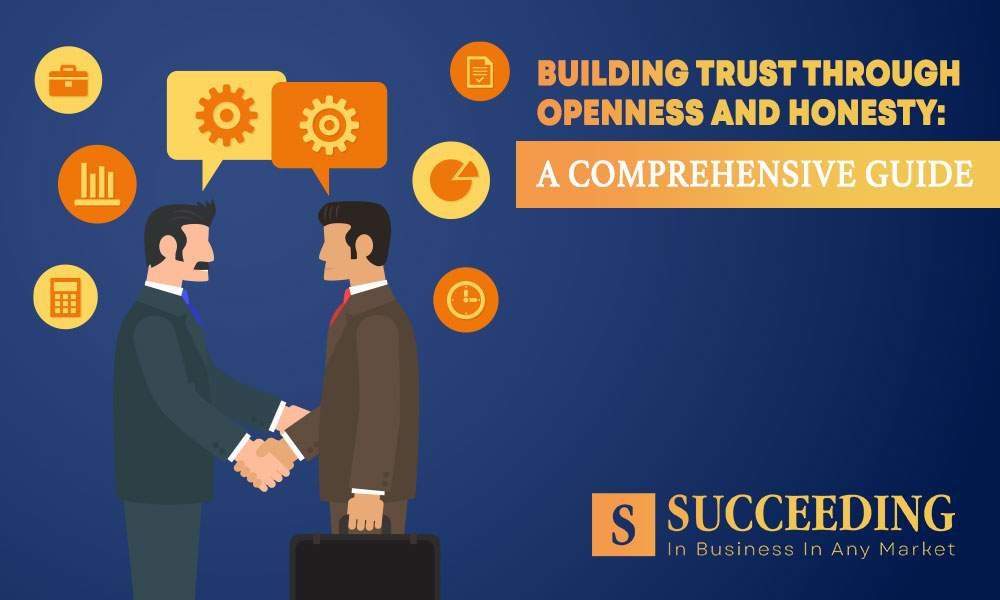Post Date: April 16, 2024

Trust is the cornerstone of any flourishing relationship, whether it’s a personal connection or a professional partnership. In this in-depth exploration, we’ll dissect the critical elements that contribute to building trust through openness and honesty. These two virtues form the bedrock of lasting and authentic relationships, shaping the way we connect and collaborate with others.
1: Understanding the Importance of Trust in Relationships
1.1 Defining Trust in Relationships
Trust is the intricate blend of reliability, truth, and strength within a relationship. It’s the invisible force that propels connections to deeper and more meaningful levels. Without trust, relationships lack the stability required for growth and longevity.
1.2 The Consequences of Broken Trust
When trust is shattered, the repercussions are profound. It undermines the very foundation of a relationship, leaving behind scars that are not easily healed. Rebuilding trust becomes a formidable task, requiring intentional efforts and a commitment to openness and honesty.
2: Openness as a Pillar of Trust
2.1 Defining Openness in Relationships
Openness is the art of transparent communication and a willingness to share thoughts, feelings, and vulnerabilities. It’s the catalyst that bridges individuals on a deeper and more authentic level, fostering an environment of mutual understanding.
2.2 The Power of Vulnerability
Vulnerability is the courageous companion of openness. It involves exposing one’s true self, showcasing authenticity, and inviting reciprocation. Through vulnerability, openness becomes a potent force that fortifies connections.
3: Honesty as the Cornerstone of Trust
3.1 Defining Honesty in Relationships
Honesty, the bedrock of trust, encompasses truthfulness, integrity, and sincerity in communication. It establishes the groundwork for genuine and enduring relationships, allowing individuals to rely on the reliability of each other’s words.
3.2 Navigating Difficult Conversations with Honesty
Honesty shines brightest in the face of challenging conversations. While uncomfortable, addressing difficult subjects with honesty and respect is paramount for maintaining trust. Honest dialogue fosters a culture of understanding and resolution.
4: Practical Strategies for Building Trust through Openness and Honesty
4.1 Fostering Open Communication
Open communication is the lifeblood of trust. Creating an environment where individuals feel safe expressing themselves openly involves active listening, validating perspectives, and cultivating a culture that values honest dialogue.
4.2 Cultivating a Culture of Honesty
In both personal and professional spheres, cultivating a culture of honesty is a transformative endeavor. Transparency and integrity should be woven into the fabric of interactions, creating a space where trust can thrive.
5: Overcoming Challenges in Building Trust
5.1 Rebuilding Trust After a Breach
Rebuilding trust is a delicate process that demands sincere efforts. Genuine apologies, taking accountability and consistently aligning actions with regained trust are vital steps in the journey toward rebuilding what was lost.
5.2 Managing Fear of Vulnerability
Fear of vulnerability is a common obstacle on the path to openness and honesty. Acknowledging that vulnerability is a strength, gradually exposing oneself to openness, and understanding that authentic connections stem from vulnerability are key steps in overcoming this fear.

Conclusion
In conclusion, building trust through openness and honesty is a dynamic and continuous journey. It requires self-reflection, courage, and a steadfast commitment to fostering genuine connections. The rewards, however, are relationships that stand the test of time and adversity.
Take a moment to reflect on your communication style and relationships. Identify areas where you can enhance openness and honesty. Implement practical steps to create an environment that nurtures trust and strengthens the bonds you share with others.
FAQs:
Q1: Can you build trust without being completely open about everything?
Yes, building trust doesn’t mandate revealing every detail of your life. It involves sharing appropriately and authentically and respecting the nature of the relationship. Transparency is essential, but the extent of openness can vary based on mutual comfort and understanding.
Q2: How do you navigate honesty in professional settings without causing conflict?
Approaching honesty in professional settings requires diplomacy. Choose words carefully, focus on facts, and express thoughts with respect. Constructive feedback, delivered with honesty and tact, fosters growth without unnecessary conflict.
Q3: Is it possible to rebuild trust after a major breach of honesty?
Yes, but it demands sincere efforts. Acknowledge the breach, take responsibility, and demonstrate consistent honesty over time. Rebuilding trust is a gradual process that requires commitment from all parties involved.
Q4: Can a culture of honesty be instilled in an organization?
Absolutely. Leadership plays a crucial role in setting the tone for honesty. Implement transparent communication, recognize and reward integrity, and create a safe space for open dialogue. Over time, a culture of honesty can become ingrained.
Q5: How do you overcome the fear of being vulnerable in relationships?
Start by acknowledging that vulnerability is a natural part of genuine connections. Take small steps, gradually opening up to trusted individuals. Surround yourself with supportive people who appreciate authenticity, fostering an environment where vulnerability is embraced.






